| Listing 1 - 10 of 16 | << page >> |
Sort by
|
Book
ISBN: 9781593277420 1593277423 Year: 2018 Publisher: San Francisco : No Starch Press, Inc.,
Abstract | Keywords | Export | Availability | Bookmark
 Loading...
Loading...Choose an application
- Reference Manager
- EndNote
- RefWorks (Direct export to RefWorks)
"Cryptography is hard, but it's less hard when it's filled with adorable Japanese manga. The latest addition to the Manga Guide series, The Manga Guide to Cryptography, turns the art of encryption and decryption into plain, comic-illustrated English. As you follow Inspector Jun Meguro in his quest to bring a cipher-wielding thief to justice, you'll learn how cryptographic ciphers work. (Ciphers are the algorithms at the heart of cryptography.) Like all books in the Manga Guide series, The Manga Guide to Cryptography is illustrated throughout with memorable Japanese manga as it dives deep into advanced cryptography topics, such as classic substitution, polyalphabetic, and transposition ciphers; symmetric-key algorithms like block and DES (Data Encryption Standard) ciphers; and how to use public key encryption technology. It also explores practical applications of encryption such as digital signatures, password security, and identity fraud countermeasures. The Manga Guide to Cryptography is the perfect introduction to cryptography for programmers, security professionals, aspiring cryptographers, and anyone who finds cryptography just a little bit hard." [Publisher]
Public key cryptography. --- Telecommunication --- Cryptographie à clé publique. --- Télécommunications --- Security measures. --- Mesures de sûreté.
Book
ISBN: 9782340096370 Year: 2024 Publisher: Paris : Ellipses,
Abstract | Keywords | Export | Availability | Bookmark
 Loading...
Loading...Choose an application
- Reference Manager
- EndNote
- RefWorks (Direct export to RefWorks)
Le Darknet est cette partie d'internet où les communications se veulent anonymes. Il doit sa notoriété aux innombrables activités déviantes qui s'y épanouissent, mais il est bien plus que cela. Le Darknet est complexe et ambivalent. Il forme un espace hétérogène, à la fois sombre et lumineux, où truands, geeks, journalistes, activistes et dissidents côtoient une population tout simplement soucieuse du respect de sa vie privée. C'est cette réalité technique et sociale que ce livre souhaite présenter. Il décrit les technologies fondamentales comme les réseaux pair-à-pair, la cryptographie à clé publique ou les mixnets et détaille l'usage et le fonctionnement des grands environnements anonymes tels Tor, Freenet ou I2P. Il s'attarde sur les cryptomonnaies et les Bitcoins, cette fascinante innovation qui est au cœur des échanges illégaux, mais aussi sur la blockchain qui est à l'origine de nouveaux outils de lutte contre la censure et la surveillance. Le lecteur y croisera les inévitables trafiquants de drogues, des vendeurs de faux papiers ou des tueurs à gages, mais aussi Edward Snowden, WikiLeaks, la communauté homosexuelle africaine, les manifestants iraniens ou encore des dissidents syriens, russes, chinois... Des marchés noirs aux " interrupteurs pour échapper au contrôle " chers à Gilles Deleuze, le Darknet est une réalité complexe et mouvante qui témoigne de l'intimité du lien entre les évolutions techniques et les dynamiques sociales.
Cybercriminalité. --- Utilisation de l'internet. --- Cryptographie à clé publique. --- Poste à poste (Internet) --- Bitcoin. --- Cryptomonnaie. --- Réseaux anonymes (informatique)
Book
ISBN: 9781420075182 1420075187 Year: 2010 Publisher: Boca Raton : CRC Press,
Abstract | Keywords | Export | Availability | Bookmark
 Loading...
Loading...Choose an application
- Reference Manager
- EndNote
- RefWorks (Direct export to RefWorks)
Telecommunication --- Public key cryptography. --- Computer security. --- Télécommunications --- Cryptographie à clé publique --- Sécurité informatique --- Security measures --- Mathematics --- Sécurité --- Mesures --- Mathématiques

ISBN: 0072131233 Year: 2001 Publisher: New York : Osborne/McGraw-Hill,
Abstract | Keywords | Export | Availability | Bookmark
 Loading...
Loading...Choose an application
- Reference Manager
- EndNote
- RefWorks (Direct export to RefWorks)
Computer networks --- Computers --- Computer security --- Public key cryptography --- Réseaux d'ordinateurs --- Sécurité informatique --- Cryptographie à clé publique --- Security measures --- Access control --- Sécurité --- Mesures --- Public key infrastructure (Computer security) --- -681.3*D46 --- 005.8 --- Communication systems, Computer --- Computer communication systems --- Data networks, Computer --- ECNs (Electronic communication networks) --- Electronic communication networks --- Networks, Computer --- Teleprocessing networks --- Data transmission systems --- Digital communications --- Electronic systems --- Information networks --- Telecommunication --- Cyberinfrastructure --- Electronic data processing --- Network computers --- Infrastructure, Public key (Computer security) --- PKI (Computer security) --- Trust hierarchy (Computer security) --- Security and protection: access controls; authentication; cryptographic controls; information flow controls; security kernels; verification (Operating systems) --- Distributed processing --- 681.3*D46 Security and protection: access controls; authentication; cryptographic controls; information flow controls; security kernels; verification (Operating systems) --- Computer security. --- Réseaux d'ordinateurs --- Sécurité informatique --- Cryptographie à clé publique --- Sécurité --- 681.3*D46 --- Computer network security --- Network security, Computer --- Security of computer networks
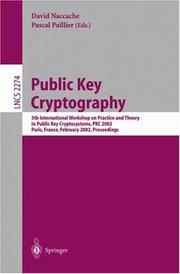
ISBN: 3540431683 3540456643 Year: 2002 Volume: 2274 Publisher: Berlin, Heidelberg : Springer Berlin Heidelberg : Imprint: Springer,
Abstract | Keywords | Export | Availability | Bookmark
 Loading...
Loading...Choose an application
- Reference Manager
- EndNote
- RefWorks (Direct export to RefWorks)
Computer security --- Computers --- Data encryption (Computer science) --- Public key cryptography --- Sécurité informatique --- Ordinateurs --- Chiffrement (Informatique) --- Cryptographie à clé publique --- Congresses --- Access control --- Congresses. --- Congrès --- Accès --- Contrôle --- Computer Science --- Engineering & Applied Sciences --- Sécurité informatique --- Cryptographie à clé publique --- Congrès --- Accès --- Contrôle --- Asymmetric cryptography --- Public key cryptosystems --- Public key encryption --- Computer science. --- Computer communication systems. --- Data encryption (Computer science). --- Algorithms. --- Computer Science. --- Data Encryption. --- Algorithm Analysis and Problem Complexity. --- Computer Communication Networks. --- Cryptography --- Computer software. --- Cryptology. --- Data encoding (Computer science) --- Encryption of data (Computer science) --- Software, Computer --- Computer systems --- Communication systems, Computer --- Computer communication systems --- Data networks, Computer --- ECNs (Electronic communication networks) --- Electronic communication networks --- Networks, Computer --- Teleprocessing networks --- Data transmission systems --- Digital communications --- Electronic systems --- Information networks --- Telecommunication --- Cyberinfrastructure --- Electronic data processing --- Network computers --- Algorism --- Algebra --- Arithmetic --- Distributed processing --- Foundations --- Computer networks.
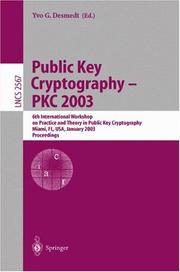
ISBN: 9783540003243 354000324X 3540362886 Year: 2002 Volume: 2567 Publisher: Berlin, Heidelberg : Springer Berlin Heidelberg : Imprint: Springer,
Abstract | Keywords | Export | Availability | Bookmark
 Loading...
Loading...Choose an application
- Reference Manager
- EndNote
- RefWorks (Direct export to RefWorks)
PKC 2003 was the Sixth International Workshop on Practice and Theory in Public Key Cryptography and was sponsored by IACR, the International As- ciation for Cryptologic Research (www.iacr.org). This year the workshop was organized in cooperation with the Department of Computer Science, Florida State University. The General Chair, Mike Burmester was responsible for local organization, registration, etc. There were 105 submitted papers which were considered by the Program Committee. This is an increase of 52% compared to PKC 2002, which took place in Paris, France, February 2002, and which was incorrectly identi?ed on the cover of the proceedings as being the fourth workshop. Due to the large number of submissions, some papers that contained new ideas had to be rejected. Priority was given to novel papers. Of the 105 submissions, 26 were selected for the proceedings. These contain the revised versions of the accepted papers. Each paper was sent to at least 3 members of the program committee for comments. Revisions were not checked for correctness of their scienti?c aspects and the authors bear full responsibility for the contents of their papers. Some authors will write ?nal versions of their papers for publication in refereed journals. I am very grateful to the members of the Program Committee for their hard work in the di?cult task of selecting roughly 1 out of 4 of the submitted papers.
Computer security --- Computers --- Data encryption (Computer science) --- Public key cryptography --- Sécurité informatique --- Ordinateurs --- Chiffrement (Informatique) --- Cryptographie à clé publique --- Congresses --- Access control --- Congrès --- Accès --- Contrôle --- Sécurité informatique --- Cryptographie à clé publique --- Congrès --- Accès --- Contrôle --- Asymmetric cryptography --- Public key cryptosystems --- Public key encryption --- Computer science. --- Computer communication systems. --- Data encryption (Computer science). --- Algorithms. --- Computers and civilization. --- Management information systems. --- Computer Science. --- Data Encryption. --- Computer Science, general. --- Computer Communication Networks. --- Algorithm Analysis and Problem Complexity. --- Computers and Society. --- Management of Computing and Information Systems. --- Cryptography --- Computer software. --- Information Systems. --- Cryptology. --- Software, Computer --- Computer systems --- Informatics --- Science --- Data encoding (Computer science) --- Encryption of data (Computer science) --- Computer-based information systems --- EIS (Information systems) --- Executive information systems --- MIS (Information systems) --- Sociotechnical systems --- Information resources management --- Management --- Civilization and computers --- Civilization --- Algorism --- Algebra --- Arithmetic --- Communication systems, Computer --- Computer communication systems --- Data networks, Computer --- ECNs (Electronic communication networks) --- Electronic communication networks --- Networks, Computer --- Teleprocessing networks --- Data transmission systems --- Digital communications --- Electronic systems --- Information networks --- Telecommunication --- Cyberinfrastructure --- Electronic data processing --- Network computers --- Communication systems --- Foundations --- Distributed processing --- Computer networks.
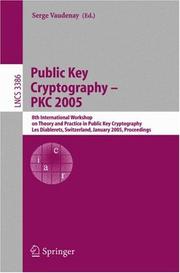
ISBN: 9783540224547 3540244549 3540305807 Year: 2005 Volume: 3386 Publisher: Berlin ; New York : Springer,
Abstract | Keywords | Export | Availability | Bookmark
 Loading...
Loading...Choose an application
- Reference Manager
- EndNote
- RefWorks (Direct export to RefWorks)
Computer security --- Computers --- Data encryption (Computer science) --- Public key cryptography --- Sécurité informatique --- Ordinateurs --- Chiffrement (Informatique) --- Cryptographie à clé publique --- Congresses --- Access control --- Congrès --- Accès --- Contrôle --- Engineering & Applied Sciences --- Computer Science --- Sécurité informatique --- Cryptographie à clé publique --- Congrès --- Accès --- Contrôle --- EPUB-LIV-FT SPRINGER-B --- Asymmetric cryptography --- Public key cryptosystems --- Public key encryption --- Computer science. --- Computer communication systems. --- Data encryption (Computer science). --- Algorithms. --- Computers and civilization. --- Management information systems. --- Computer Science. --- Data Encryption. --- Algorithm Analysis and Problem Complexity. --- Computer Communication Networks. --- Computers and Society. --- Management of Computing and Information Systems. --- Computer-based information systems --- EIS (Information systems) --- Executive information systems --- MIS (Information systems) --- Sociotechnical systems --- Information resources management --- Management --- Civilization and computers --- Civilization --- Algorism --- Algebra --- Arithmetic --- Data encoding (Computer science) --- Encryption of data (Computer science) --- Cryptography --- Communication systems, Computer --- Computer communication systems --- Data networks, Computer --- ECNs (Electronic communication networks) --- Electronic communication networks --- Networks, Computer --- Teleprocessing networks --- Data transmission systems --- Digital communications --- Electronic systems --- Information networks --- Telecommunication --- Cyberinfrastructure --- Electronic data processing --- Network computers --- Informatics --- Science --- Communication systems --- Foundations --- Distributed processing --- Computer software. --- Information Systems. --- Cryptology. --- Software, Computer --- Computer systems
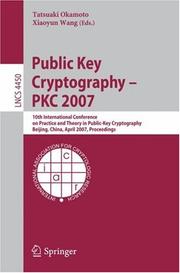
ISBN: 9783540716761 3540716769 9786610949151 1280949155 3540716777 Year: 2007 Volume: 4450 Publisher: Berlin, Germany : Springer,
Abstract | Keywords | Export | Availability | Bookmark
 Loading...
Loading...Choose an application
- Reference Manager
- EndNote
- RefWorks (Direct export to RefWorks)
Computer security --- Computers --- Data encryption (Computer science) --- Public key cryptography --- Sécurité informatique --- Ordinateurs --- Chiffrement (Informatique) --- Cryptographie à clé publique --- Congresses --- Access control --- Congresses. --- Congrès --- Accès --- Contrôle --- Computer security -- Congresses. --- Computers -- Access control -- Congresses. --- Data encryption (Computer science) -- Congresses. --- Electronic books. -- local. --- Public key cryptography -- Congresses. --- Public-key cryptography --- Engineering & Applied Sciences --- Computer Science --- Sécurité informatique --- Cryptographie à clé publique --- Congrès --- Accès --- Contrôle --- EPUB-LIV-FT SPRINGER-B --- Asymmetric cryptography --- Public key cryptosystems --- Public key encryption --- Computer science. --- Computer communication systems. --- Data encryption (Computer science). --- Algorithms. --- Computers and civilization. --- Management information systems. --- Computer engineering. --- Computer Science. --- Data Encryption. --- Computer Engineering. --- Algorithm Analysis and Problem Complexity. --- Computer Communication Networks. --- Computers and Society. --- Management of Computing and Information Systems. --- Computer-based information systems --- EIS (Information systems) --- Executive information systems --- MIS (Information systems) --- Sociotechnical systems --- Information resources management --- Management --- Civilization and computers --- Civilization --- Algorism --- Algebra --- Arithmetic --- Data encoding (Computer science) --- Encryption of data (Computer science) --- Cryptography --- Communication systems, Computer --- Computer communication systems --- Data networks, Computer --- ECNs (Electronic communication networks) --- Electronic communication networks --- Networks, Computer --- Teleprocessing networks --- Data transmission systems --- Digital communications --- Electronic systems --- Information networks --- Telecommunication --- Cyberinfrastructure --- Electronic data processing --- Network computers --- Informatics --- Science --- Design and construction --- Communication systems --- Foundations --- Distributed processing --- Computer software. --- Information Systems. --- Cryptology. --- Software, Computer --- Computer systems
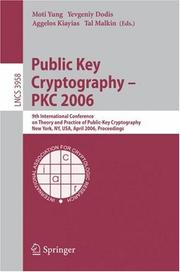
ISBN: 9783540338512 3540338519 3540338527 Year: 2006 Volume: 3958 Publisher: Berlin ; New York : Springer,
Abstract | Keywords | Export | Availability | Bookmark
 Loading...
Loading...Choose an application
- Reference Manager
- EndNote
- RefWorks (Direct export to RefWorks)
The 9th International Conference on Theory and Practice of Public-Key Cr- tography(PKC 2006) took place in New York City. PKC is the premier inter- tional conference dedicated to cryptology focusing on all aspects of public-key cryptography. The event is sponsored by the International Association of Cr- tologic Research (IACR), and this year it was also sponsored by the Columbia University Computer Science Department as well as a number of sponsors from industry, among them: EADS and Morgan Stanley, which were golden sponsors, as well as Gemplus, NTT DoCoMo, Google, Microsoft and RSA Security, which were silver sponsors. We acknowledge the generous support of our industrial sponsors; their support was a major contributing factor to the success of this year’s PKC. PKC 2006 followed a series of very successful conferences that started in 1998in Yokohama,Japan.Further meetingswereheld successivelyinKamakura (Japan), Melbourne (Australia), Jeju Island (Korea), Paris (France), Miami (USA), Singapore and Les Diablerets (Switzerland). The conference became an IACR sponsored event (o?cially designated as an IACR workshop) in 2003 and has been sponsored by IACR continuously since then. The year 2006 found us all in New York City where the undertone of the conference was hummed in the relentless rhythm of the city that never sleeps.
Computer security --- Computers --- Data encryption (Computer science) --- Public key cryptography --- Sécurité informatique --- Ordinateurs --- Chiffrement (Informatique) --- Cryptographie à clé publique --- Congresses --- Access control --- Congrès --- Accès --- Contrôle --- Computer Science --- Engineering & Applied Sciences --- Sécurité informatique --- Cryptographie à clé publique --- Congrès --- Accès --- Contrôle --- EPUB-LIV-FT SPRINGER-B --- Asymmetric cryptography --- Public key cryptosystems --- Public key encryption --- Computer science. --- Computer communication systems. --- Data encryption (Computer science). --- Algorithms. --- Computers and civilization. --- Management information systems. --- Computer Science. --- Data Encryption. --- Algorithm Analysis and Problem Complexity. --- Computer Communication Networks. --- Computers and Society. --- Management of Computing and Information Systems. --- Computer-based information systems --- EIS (Information systems) --- Executive information systems --- MIS (Information systems) --- Sociotechnical systems --- Information resources management --- Management --- Civilization and computers --- Civilization --- Algorism --- Algebra --- Arithmetic --- Data encoding (Computer science) --- Encryption of data (Computer science) --- Cryptography --- Communication systems, Computer --- Computer communication systems --- Data networks, Computer --- ECNs (Electronic communication networks) --- Electronic communication networks --- Networks, Computer --- Teleprocessing networks --- Data transmission systems --- Digital communications --- Electronic systems --- Information networks --- Telecommunication --- Cyberinfrastructure --- Electronic data processing --- Network computers --- Informatics --- Science --- Communication systems --- Foundations --- Distributed processing --- Computer software. --- Information Systems. --- Cryptology. --- Software, Computer --- Computer systems --- Cryptography. --- Computer networks. --- Electronic data processing—Management. --- IT Operations. --- Cryptanalysis --- Cryptology --- Secret writing --- Steganography --- Signs and symbols --- Symbolism --- Writing --- Ciphers

ISBN: 038795273X 9786610188468 1280188464 0387218467 9780387952734 Year: 2004 Publisher: New York (N.Y.): Springer,
Abstract | Keywords | Export | Availability | Bookmark
 Loading...
Loading...Choose an application
- Reference Manager
- EndNote
- RefWorks (Direct export to RefWorks)
After two decades of research and development, elliptic curve cryptography now has widespread exposure and acceptance. Industry, banking, and government standards are in place to facilitate extensive deployment of this efficient public-key mechanism. Anchored by a comprehensive treatment of the practical aspects of elliptic curve cryptography, this guide explains the basic mathematics, describes state-of-the art implementation methods, and presents standardized protocols for public-key encryption, digital signatures, and key establishment. In addition, the book addresses some issues that arise in software and hardware implementation, side-channel attacks and countermeasures, and efficient parameter generation. Readers receive the theoretical fundamentals as an underpinning for a wealth of practical and accessible knowledge on efficient application. Features: *Breadth of coverage and unified, integrated approach to elliptic curve cryptosystems *Describes important protocols developed by industry and government, such as the FIPS 186-2 standard from the U.S. National Institute for Standards and Technology *Provides full exposition on key techniques for efficiently implementing finite-field and elliptic curve arithmetic *Distills complex mathematics and algorithms for easy understanding, yet total subject integration *Includes useful literature references in each chapter, as well as a list of algorithms and appendixes on sample parameters, ECC standards, and software tools This all-embracing and highly focused reference offers a unique overview and strategic viewpoint for one of the most widely used cryptosystems in wireless devices and smart cards today. It is an indispensable resource for any practitioners, professionals, or researchers in computer science, computer engineering, network design, and network data security. Darrel Hankerson is an industry consultant and author of books on cryptography and data compression. Alfred Menezes is co-director of the University of Waterloo’s Center for Applied Cryptographic Research, leader of an ECC algorithm standardization committee, and author of books on cryptography and cryptosystems. Scott Vanstone coauthored an applied cryptography handbook with A. Menezes and is founder of Certicom Corp. (Canada), a leading ECC company. Key topics: >> Public-key cryptography >> Cryptographic protocols >> Attacks and secure implementation >> Domain parameters >> Signature schemes >> Key establishment >> ECC standards >> Finite- and binary-field arithmetic ____________________________________ -- Security / Cryptography -- Beginning / Intermediate Level.
Computer security. --- Public key cryptography. --- Sécurité informatique --- Cryptographie à clé publique --- EPUB-LIV-FT SPRINGER-B --- 681.3*E3 Data encryption: data encryption standard; DES; public key cryptosystems --- Data encryption: data encryption standard; DES; public key cryptosystems --- Asymmetric cryptography --- Public key cryptosystems --- Public key encryption --- Computer science. --- Data encryption (Computer science). --- Coding theory. --- Computer Science. --- Data Encryption. --- Coding and Information Theory. --- Computer security --- Public key cryptography --- 681.3*E3 --- Cryptography --- Computer privacy --- Computer system security --- Computer systems --- Computers --- Cyber security --- Cybersecurity --- Electronic digital computers --- Protection of computer systems --- Security of computer systems --- Data protection --- Security systems --- Hacking --- Protection --- Security measures --- Cryptology. --- Information theory. --- Communication theory --- Communication --- Cybernetics --- Data compression (Telecommunication) --- Digital electronics --- Information theory --- Machine theory --- Signal theory (Telecommunication) --- Computer programming --- Data encoding (Computer science) --- Encryption of data (Computer science)
| Listing 1 - 10 of 16 | << page >> |
Sort by
|

 Search
Search Feedback
Feedback About UniCat
About UniCat  Help
Help News
News